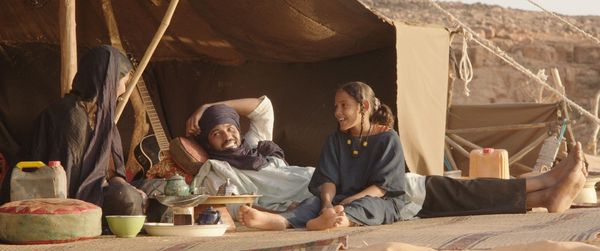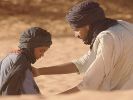Eye For Film >> Movies >> Timbuktu (2014) Film Review
Timbuktu
Reviewed by: Anne-Katrin Titze

Abderrahmane Sissako opens up his unflinching, harrowing look at the occupation of Timbuktu and the state of the world with two carefully chosen symbolic acts. A gazelle galloping through the dust is chased by armed militants in a car. We hear shots and the command "don't kill it - tire it!" The shots continue into the next image of ancestral clay figures, local artifacts, set up to form a shooting gallery for target practice. Smoke emanates from a statue's mouth - a picture terribly appropriate and foretelling of things to come.
The rebels have a blindfolded man with them. The threat within the confusion is precisely the point. What might generally be called nature and culture don't count for much in the new regime, ruled over by religious fundamentalists, that is about to be established in the Malian city and the surrounding region. The actual occupation of Timbuktu in 2012 lasted one year and as filming there would have still been too dangerous because of suicide bombings, the shoot location had to be moved to Mauritania.

Timbuktu is woven together by two strands of stories - country life and city life. In the dunes outside lives cattle herder Kidane (Ibrahim Ahmed, aka Pino) with his wife Satima (Toulou Kiki), his daughter Toya (Layla Walet Mohamed), and twelve-year-old Issan (Mehdi Ag Mohamed), their adopted son and shepherd. The Tuareg family's favorite cow is called GPS and Director of Photography Sofian El Fani, who worked with Abdellatif Kechiche on Blue Is The Warmest Color, presents us with peaceful, idyllic images of cows walking leisurely around a small lake in the middle of which a fisherman is arranging his nets. Just how deceiving the harmony of the beautiful images turns out to be, will come into deadly focus down the line.
The city, meanwhile, is bombarded by endless, multi-lingual announcements from transported loudspeakers, informing the population of the new rules. Music, tobacco and soccer are forbidden and women must wear socks and gloves. A man appears randomly stopped on the street and is forced to roll up his pants. What's more, the foreign Jihadists enter the local house of God in shoes and with weapons, ignoring the arguments of its Imam (Adel Mahmoud Cherif) who tries to make sense to the intruders. Making sense is not on their agenda. A woman at the market protests that she cannot sell fish with gloves and dares the occupiers to cut off her hands. They don't know what to do with these acts of defiance.
Inside their exposed tent in the desert, Kidane and his family talk and have tea. You want to have another look at Satima's jewelry and enjoy the beauty of the landscape but you can't. Necks look proud and vulnerable. One of the main Jihadists, who rides through the dunes with his driver/translator is a secret smoker and always comes by to see Satima when her husband is away.
Women in Timbuktu are front and centre in resisting. A woman with a pet rooster (Fatoumata Diawara) drifts through the streets, she sings and laughs, sent out of her mind by the madness around her or in her own head. We fear for her. The men with guns ignore her. The woman's mad laughter is too powerful a weapon.
The armed forces display a spectacle of mismatched variance in punishment. How many public lashes are appropriate for playing soccer? Without a ball? Adultery, we are told and shown, results in death by stoning. The killing by stoning of an unmarried couple in the small town of Aguelhok in the north of Mali in 2012, committed by occupiers, was posted online and became the impetus for his film, said Sissako in a statement. The discrepancy between the unspeakable crime and the world's indifference to it, suffuses the spirit of Timbuktu, co-written by Kessen Tall.
A tired donkey walks through ancient streets. A shot kills a fisherman. A group of friends make music in their home in dissent - a woman sings a pensive song about Timbuktu. People are sleeping on roofs while others are patrolling on roofs with machine guns.
"The judge is a good man," they say and also that you have to "earn forgiveness". How can you give blood money of 40 cows when you only have 7 cows left? Chaos forming detachment and a confusingly wide range of dialects and languages make any sense of justice seem like a faraway dream. As spectator, one is tempted to wish that what we are watching were a dystopian tale, so much in fashion right now, and that the strong women shown weren't treated as so terribly disposable.
In a scene in which a woman endures public flogging, she sings while being whipped for her crime of singing. Girls are married off against their will and without their families' consent. The "forced brides" making "legal" what amounts to kidnapping and rape. The punishments conjure up impressions of the likes of Roland Freisler, the notorious Nazi judge and President of the People's Court, which stood independent of any constitution.
Was the well-being of the population ever even a concern? Michel Foucault on a historical type of society fits the bill in Timbuktu too: "Power in this instance was essentially a right of seizure: of things, time, bodies, and ultimately life itself; it culminated in the privilege to seize hold of life in order to suppress it."
How do the old and the new connect? The smashing of traditions is not a return to a well-organised hierarchy of faith. In one of the most telling scenes, a teenage boy is seen making a video in which he explains that he is now a soldier and that he has given up rap, which meant so much to him in the past. The man behind the camera tells him that he isn't convincing enough. The spotlight needs to be fixed.
The way Sissako exposes the double standard makes the Jihadists' behavior no less threatening, on the contrary. Yet, figuring out the layered logic of the terror seems to be the far-reaching clear objective of his courageous storytelling.
Timbuktu, Mauritania's submission for Best Foreign Language Film has received an Oscar nomination and will open in the UK on May 22.
Reviewed on: 02 Feb 2015















